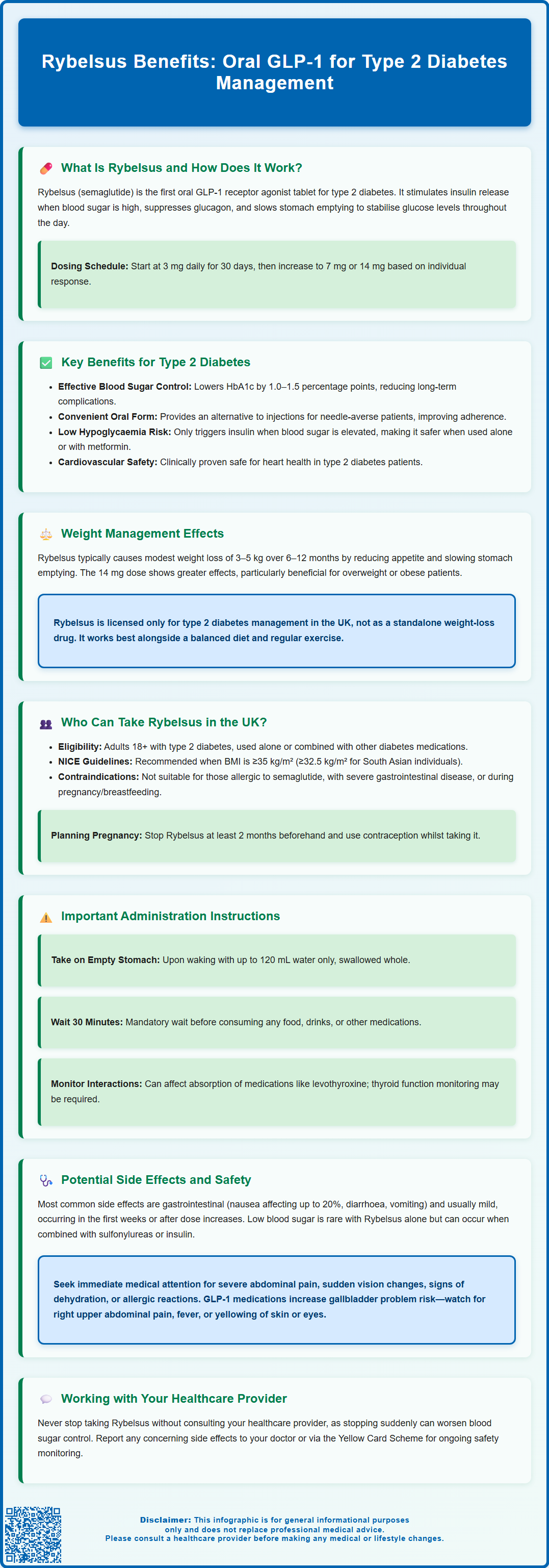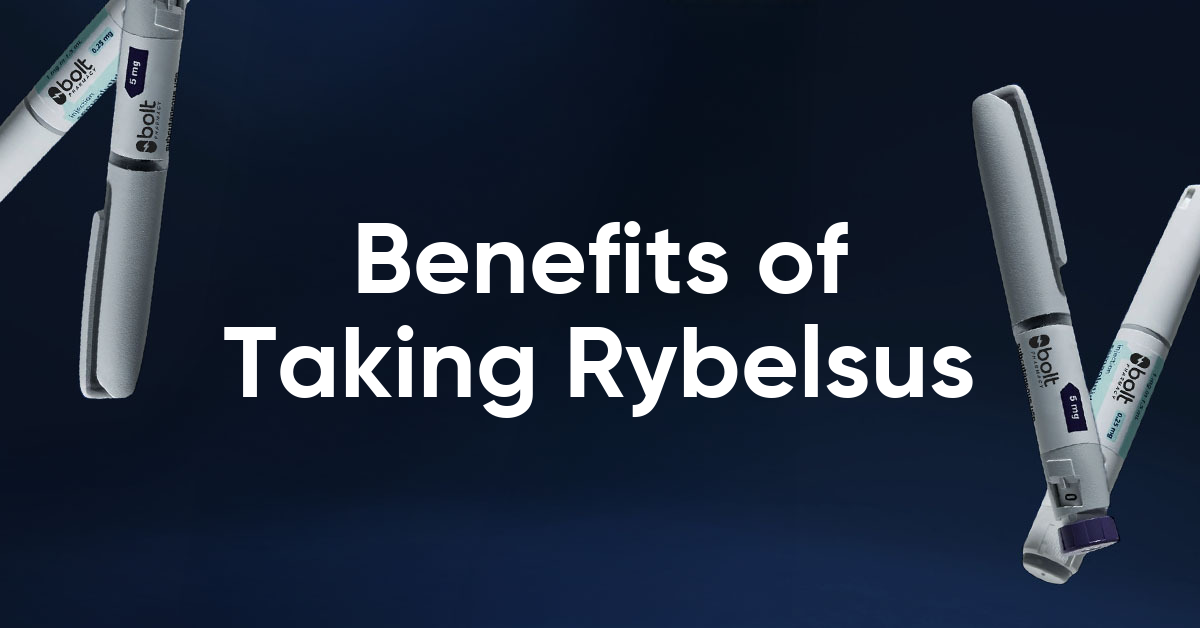Rybelsus (semaglutide) is the first oral glucagon-like peptide-1 (GLP-1) receptor agonist licensed in the UK for managing type 2 diabetes mellitus in adults. Unlike injectable GLP-1 therapies, Rybelsus offers a convenient tablet option for patients seeking effective blood glucose control without needles. This medication works by mimicking natural hormones that regulate insulin secretion, suppress glucagon release, and slow gastric emptying. Clinical evidence demonstrates that Rybelsus improves HbA1c levels, supports modest weight reduction, and carries a low risk of hypoglycaemia when used appropriately. Understanding how Rybelsus works, its clinical benefits, and safety considerations helps patients and healthcare professionals make informed treatment decisions within the NHS diabetes care pathway.
Summary: Rybelsus (semaglutide) is an oral GLP-1 receptor agonist that improves blood glucose control in adults with type 2 diabetes by stimulating insulin secretion, suppressing glucagon, and slowing gastric emptying.
- Rybelsus is the first oral GLP-1 receptor agonist licensed in the UK, offering a tablet alternative to injectable diabetes treatments.
- Clinical trials show Rybelsus reduces HbA1c by approximately 1.0–1.5 percentage points, improving long-term glycaemic control.
- The medication works through glucose-dependent insulin secretion, reducing hypoglycaemia risk when used alone or with metformin.
- Rybelsus is licensed specifically for type 2 diabetes management in adults, not as a standalone weight-loss treatment.
- Common side effects include gastrointestinal symptoms (nausea, diarrhoea) that typically diminish over time with proper dosing.
- Patients must take Rybelsus correctly—on waking with up to 120 mL water, waiting 30 minutes before food or other medicines—for optimal absorption.
Table of Contents
What Is Rybelsus and How Does It Work?
Rybelsus (semaglutide) is an oral medication licensed in the UK for the treatment of type 2 diabetes mellitus in adults. It belongs to a class of medicines called glucagon-like peptide-1 (GLP-1) receptor agonists. Rybelsus is notable as the first GLP-1 receptor agonist available in tablet form, offering an alternative to injectable formulations.
The active ingredient, semaglutide, works by mimicking the action of the naturally occurring hormone GLP-1, which is released by the intestine in response to food intake. This mechanism produces several beneficial effects on glucose regulation. Specifically, semaglutide stimulates insulin secretion from pancreatic beta cells in a glucose-dependent manner, meaning insulin is released only when blood glucose levels are elevated. This reduces the risk of hypoglycaemia compared to some other diabetes medications.
Additionally, Rybelsus suppresses glucagon secretion, a hormone that raises blood glucose levels, thereby preventing excessive glucose production by the liver. The medication also slows gastric emptying, which moderates the rate at which glucose enters the bloodstream after meals. This multi-faceted approach helps maintain more stable blood glucose levels throughout the day.
Rybelsus is typically prescribed when diet and exercise alone, or in combination with other oral diabetes medications such as metformin, have not achieved adequate glycaemic control. The MHRA-approved dosing schedule begins with 3 mg once daily for 30 days (a starter dose for tolerability that is not effective for glycaemic control), potentially increasing to 7 mg and then 14 mg based on individual response and tolerability.
The tablet must be taken correctly for proper absorption: take on waking with up to 120 mL of water only, swallow whole (do not split or crush), and wait at least 30 minutes before any food, drink or other oral medicines. If a dose is missed, skip it and take the next dose the following day. Rybelsus may affect the absorption of other oral medicines, so caution is needed with medicines that have a narrow therapeutic index, such as levothyroxine (which may require thyroid function monitoring).

Key Benefits of Taking Rybelsus for Type 2 Diabetes
The primary benefit of Rybelsus is its effectiveness in lowering HbA1c levels, the key marker of long-term blood glucose control. Clinical trials in the PIONEER programme have demonstrated that oral semaglutide can reduce HbA1c by approximately 1.0–1.5 percentage points, with greater reductions typically seen with the 14 mg dose compared to 7 mg. This improvement in glycaemic control is associated with a reduced risk of diabetes-related microvascular complications over time.
Another significant advantage is the convenience of oral administration. Unlike injectable GLP-1 receptor agonists, Rybelsus offers patients who are needle-averse or prefer not to inject a viable treatment option. This can improve treatment adherence and patient satisfaction, which are crucial factors in long-term diabetes management.
Rybelsus also carries a low risk of hypoglycaemia when used alone or with metformin, as its glucose-dependent mechanism means insulin secretion only occurs when blood glucose is elevated. This safety profile makes it particularly suitable for patients concerned about low blood sugar episodes that can affect daily activities and quality of life.
Regarding cardiovascular effects, clinical trials have demonstrated cardiovascular safety for oral semaglutide. While injectable semaglutide has shown cardiovascular benefits, the evidence for oral semaglutide (Rybelsus) in the UK supports cardiovascular safety (non-inferiority) rather than a specific risk-reduction claim. Patients should discuss individual risk-benefit considerations with their healthcare provider.
NICE guidance (NG28) recognises GLP-1 receptor agonists as valuable treatment options within the stepped care approach to type 2 diabetes management. They may be considered as part of dual or triple therapy when specific criteria are met, including BMI thresholds (≥35 kg/m² or ≥32.5 kg/m² in certain ethnic groups) and when weight loss would benefit other obesity-related comorbidities.
Weight Management Effects with Rybelsus
A notable benefit of Rybelsus that extends beyond glucose control is its effect on body weight reduction. Clinical trials have consistently demonstrated that patients taking semaglutide experience modest but clinically meaningful weight loss, typically ranging from 3–5 kg over 6–12 months, with greater effects often seen with the 14 mg dose. Individual responses vary considerably, and weight loss tends to plateau over time.
The weight loss associated with Rybelsus occurs through several mechanisms. The medication reduces appetite and food intake by acting on areas of the brain involved in appetite regulation, leading to earlier satiety and reduced hunger between meals. The slowing of gastric emptying also contributes to prolonged feelings of fullness after eating. These effects can help patients adhere to dietary modifications more successfully, creating a synergistic benefit when combined with lifestyle interventions.
For individuals with type 2 diabetes, excess weight is often a significant contributing factor to insulin resistance and poor glycaemic control. Therefore, the dual benefit of improved glucose levels and weight reduction makes Rybelsus particularly valuable for overweight or obese patients. Weight loss can improve insulin sensitivity, reduce cardiovascular risk factors such as blood pressure and lipid levels, and enhance overall quality of life.
It is important to note that Rybelsus is not licensed solely as a weight-loss medication in the UK; it is specifically indicated for type 2 diabetes management and should not be used as a substitute for licensed anti-obesity treatments. Patients should not expect dramatic weight loss, and the medication works best when combined with a balanced diet and regular physical activity.
Weight loss with GLP-1 receptor agonists, including Rybelsus, has been associated with an increased risk of gallbladder problems such as gallstones. Patients should seek medical attention if they experience symptoms like right upper abdominal pain, fever, or yellowing of the skin or eyes. Healthcare professionals will monitor weight changes as part of routine diabetes care, adjusting treatment plans as necessary to optimise both metabolic and weight outcomes.
Who Can Take Rybelsus in the UK?
Rybelsus is licensed for adults aged 18 years and over with type 2 diabetes mellitus. It is not approved for use in type 1 diabetes or for the treatment of diabetic ketoacidosis. The medication can be prescribed as monotherapy when diet and exercise alone provide inadequate glycaemic control and when metformin is considered inappropriate due to intolerance or contraindications.
More commonly, Rybelsus is used as combination therapy alongside other glucose-lowering medications, including:
-
Metformin – the first-line treatment for type 2 diabetes
-
Sulfonylureas – though this combination may increase hypoglycaemia risk
-
Sodium-glucose co-transporter-2 (SGLT2) inhibitors
-
Insulin – when additional glycaemic control is required
Before prescribing Rybelsus, healthcare professionals will assess several factors, including current HbA1c levels, body mass index (BMI), cardiovascular risk profile, kidney function, and previous medication history. NICE guidance (NG28) suggests considering GLP-1 receptor agonists as part of dual or triple therapy when BMI is ≥35 kg/m² (or ≥32.5 kg/m² in people of South Asian and related ethnic groups) and weight loss would benefit other obesity-related comorbidities, or when other glucose-lowering therapies are not suitable.
According to the UK SmPC, the only formal contraindication is hypersensitivity to semaglutide or any of the excipients. However, several precautions and considerations apply:
-
Severe gastrointestinal disease – not recommended as experience is limited
-
Severe renal impairment (eGFR <15 mL/min/1.73m²) – limited experience, use with caution
-
Pregnancy and breastfeeding – not recommended; women of childbearing potential should use contraception and stop Rybelsus at least 2 months before planned pregnancy
-
Diabetic retinopathy – patients should be monitored closely, particularly when initiating treatment
Your GP or diabetes specialist will determine whether Rybelsus is appropriate based on your individual circumstances, medical history, and treatment goals.
Potential Side Effects and Safety Considerations
Like all medications, Rybelsus can cause side effects, though not everyone experiences them. The most common adverse effects are gastrointestinal in nature and typically occur during the initial weeks of treatment or following dose increases. These include:
-
Nausea (affecting up to 20% of patients)
-
Diarrhoea
-
Vomiting
-
Abdominal pain
-
Decreased appetite
-
Constipation
These symptoms are usually mild to moderate and tend to diminish over time as the body adjusts to the medication. Taking Rybelsus exactly as directed—on an empty stomach with up to 120 mL water, swallowing the tablet whole, and waiting at least 30 minutes before any food or other medicines—and eating smaller, more frequent meals may help manage these effects. Adhering to the recommended dose escalation schedule is also important for minimising side effects.
Hypoglycaemia (low blood sugar) is uncommon with Rybelsus alone but can occur when combined with sulfonylureas or insulin. Patients should be educated about recognising symptoms such as trembling, sweating, confusion, and rapid heartbeat, and know how to treat episodes promptly with fast-acting carbohydrates. Those at risk of hypoglycaemia should take precautions when driving or operating machinery.
Other potential side effects include:
-
Gallbladder problems (gallstones, inflammation) – seek medical attention for right upper abdominal pain, fever, or jaundice
-
Acute pancreatitis – severe, persistent abdominal pain radiating to the back
-
Diabetic retinopathy complications – sudden vision changes
-
Acute kidney injury – particularly in patients experiencing severe vomiting or diarrhoea leading to dehydration
-
Allergic reactions – rash, swelling, difficulty breathing
Rybelsus may affect the absorption of other oral medicines. If you take levothyroxine, your thyroid function may need monitoring. For those on warfarin or similar anticoagulants, INR monitoring may be advised.
When to contact your GP or seek urgent care:
-
Persistent vomiting preventing fluid intake
-
Severe abdominal pain
-
Signs of dehydration (dark urine, dizziness, reduced urination)
-
Unexplained weight loss or persistent nausea beyond the first few weeks
-
Any concerns about side effects affecting daily life
Regular monitoring through diabetes reviews allows healthcare professionals to assess treatment effectiveness, adjust doses appropriately, and identify any emerging safety concerns. Patients should never stop taking Rybelsus without consulting their healthcare provider, as abrupt discontinuation may lead to deterioration in glycaemic control.
If you experience any side effects, talk to your doctor, pharmacist or nurse. This includes any possible side effects not listed above. You can also report side effects directly via the Yellow Card Scheme at yellowcard.mhra.gov.uk or search for MHRA Yellow Card in the Google Play or Apple App Store.
Frequently Asked Questions
Can Rybelsus be used for weight loss in people without diabetes?
No, Rybelsus is licensed in the UK specifically for type 2 diabetes management in adults and should not be used solely as a weight-loss medication. Patients seeking weight management should discuss licensed anti-obesity treatments with their healthcare provider.
How long does it take for Rybelsus to start working?
Rybelsus begins affecting blood glucose levels within days, but the full therapeutic effect on HbA1c typically becomes apparent after 12–16 weeks of treatment. The initial 3 mg dose is for tolerability only and does not provide effective glycaemic control.
What should I do if I experience persistent nausea with Rybelsus?
Mild nausea often improves within a few weeks as your body adjusts. Eating smaller, more frequent meals and following the correct dosing instructions can help. If nausea persists beyond the first few weeks or prevents you from eating or drinking, contact your GP or diabetes nurse for advice.
The health-related content published on this site is based on credible scientific sources and is periodically reviewed to ensure accuracy and relevance. Although we aim to reflect the most current medical knowledge, the material is meant for general education and awareness only.
The information on this site is not a substitute for professional medical advice. For any health concerns, please speak with a qualified medical professional. By using this information, you acknowledge responsibility for any decisions made and understand we are not liable for any consequences that may result.
Heading 1
Heading 2
Heading 3
Heading 4
Heading 5
Heading 6
Lorem ipsum dolor sit amet, consectetur adipiscing elit, sed do eiusmod tempor incididunt ut labore et dolore magna aliqua. Ut enim ad minim veniam, quis nostrud exercitation ullamco laboris nisi ut aliquip ex ea commodo consequat. Duis aute irure dolor in reprehenderit in voluptate velit esse cillum dolore eu fugiat nulla pariatur.
Block quote
Ordered list
- Item 1
- Item 2
- Item 3
Unordered list
- Item A
- Item B
- Item C
Bold text
Emphasis
Superscript
Subscript












